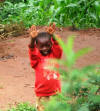MSUM
Tanzania Tour
Frequently asked questions
What is this all about?
This program offers a unique experiential
learning opportunity to MSUM students and potentially to others who are
interested. As part of
ANTH 390/Tanzanian Society & Culture (001850), we
'll
travel to Tanzania, the land of
ujamaa,
in May
and June 2014. We'll meet weekly beginning the week of March 24th. Students
will be familiarized with details of Tanzanian, society,
culture, history and the Kiswahili language before we travel. The travel
portion of the course will entail a certain level of both physical and
psychological stamina but the rewards will be great. We'll journey to
Dar es Salaam,
Zanzibar,
Arusha,
and Ngorongoro
Crater/Conservation Area. Students will experience the sights, sounds, and
feel of Africa directly. Learning will occur through lectures, game drives
("safari"), museum visits, and just "hanging out" and
paying
attention.
Why Tanzania?
 Karibu
Tanzania.
Humanity’s ancestral home is beckoning you to return home. “Karibu” is Kiswahili
for “welcome”
and that
is what you will
hear and feel
here. Tanzania is rich in human
prehistory, history, wildlife, and stunning scenery. It is also home to the most
laid back and hospitable people on earth!
Karibu
Tanzania.
Humanity’s ancestral home is beckoning you to return home. “Karibu” is Kiswahili
for “welcome”
and that
is what you will
hear and feel
here. Tanzania is rich in human
prehistory, history, wildlife, and stunning scenery. It is also home to the most
laid back and hospitable people on earth!
The
Serengeti Plains
encompass 18,000 square miles, supports 70
species of large mammals and
500
bird species.
Ngorongoro Crater
(left),
12 miles in diameter, is home to over 30,000 animals including elephants, lions,
cheetahs, wildebeests, buffaloes, and rare black rhinos.
This nation’s
human
population claims over 130 ethnic identities –
from African, European, Asian, and Arabian heritages. However,
all are proud
Tanzanians – a legacy of the country’s first
President,
Mwalimu Julius Nyerere.
East Africa’s Great Rift Valley
runs through the heart of Tanzania and contains some of the most important sites
in human evolution –
Olduvai Gorge and Laetoli.
The
Indian Ocean,
on Tanzania’s east coast, gave birth to the
Swahili
language/culture/people one thousand years ago.
The
Zanzibar
archipelago, home to almost one million
people, offers a sensory smorgasbord with its fusion of African and Arabian
influences.
Where will we be going?
Destinations/attractions will include:
-
Dar
es Salaam – “harbor of peace” – Tanzania’s largest city, financial &
cultural capital.
-
Zanzibar,
including Stone Town, Red Colobus monkeys, pristine white sand
beaches (right),
and snorkeling in the turquoise blue waters of the Indian Ocean.
-
Arusha, a bustling market town which sits in the shadow of 15,000 ft.
Mt. Meru and serves as northern Tanzania’s safari capital.
-
Ngorongoro Crater, the world’s largest intact caldera
(below right), a collapsed volcano, often called Africa's
Garden of Eden.
-
Olduvai Gorge & Laetoli, two of the most important fossil sites in human
evolution –including
Zinjanthropus
boseii (“nutcracker man”) and 3.5 million year old footprints.
Who can go?
Participation in this program is
not limited by major. I've had students from a wide range of
majors go in the past.
The
application requirements
are:
Back to East Africa Program
 Karibu
Tanzania.
Humanity’s ancestral home is beckoning you to return home. “Karibu” is Kiswahili
for “welcome”
and that
is what you will
hear and feel
here. Tanzania is rich in human
prehistory, history, wildlife, and stunning scenery. It is also home to the most
laid back and hospitable people on earth!
Karibu
Tanzania.
Humanity’s ancestral home is beckoning you to return home. “Karibu” is Kiswahili
for “welcome”
and that
is what you will
hear and feel
here. Tanzania is rich in human
prehistory, history, wildlife, and stunning scenery. It is also home to the most
laid back and hospitable people on earth!